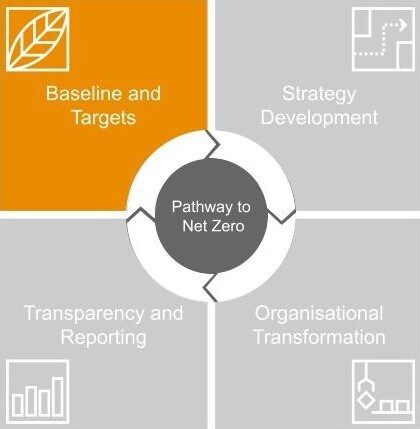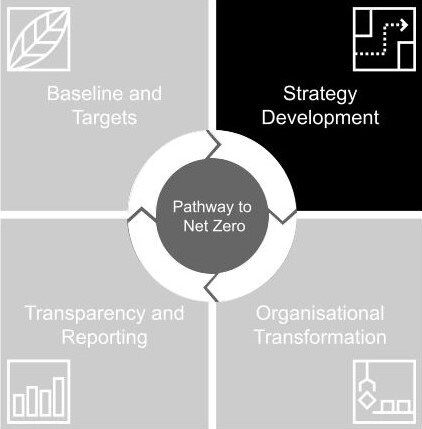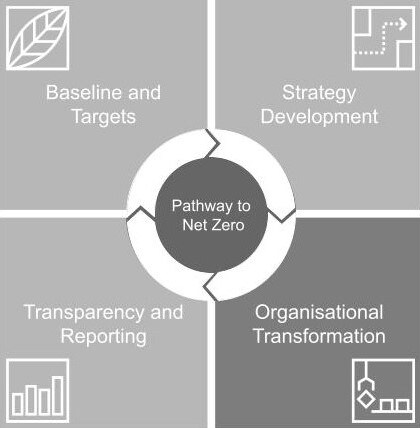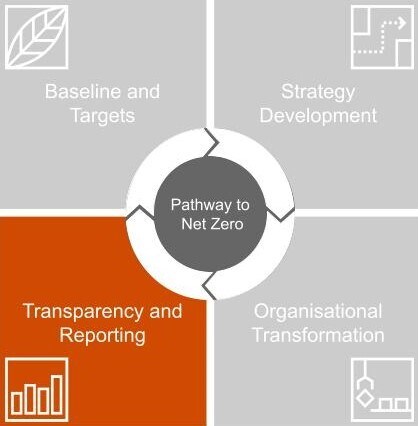
Accelerating the journey to Net Zero
Turning business commitments into real action on climate
We have seen an increase in the number of global companies committing to net zero; now companies need to translate pledges into real business transformation. This is key for both long-term business success and to address the climate crisis at the unprecedented scope and scale required.
PwC is proud to be a knowledge advisor to Microsoft on its net zero transformation. Using PwC’s experience in supporting companies on net zero and on business transformation more broadly, we have come together to create a guide to help companies as they move from ambition to action.
The Building Blocks of Corporate Net Zero Transformation - produced by PwC and commissioned by Microsoft - is the first company research contribution to the Transform to Net Zero initiative. It sets the scene for what is meant by net zero transformation for businesses and provides a platform that is consistent with the narrative for the work of the Transform to Net Zero initiative.
Delivering on net zero requires wholesale business transformation and functions across the organization need to play a vital role in implementation. No area remains untouched - from strategy, product development, sales and marketing, innovation and R&D to corporate finance, risk and compliance, procurement and people.
The report - intended for business executives and function heads - outlines the 9 key building blocks for business transformation needed to deliver net zero. It provides a coherent and good practice framework that business stakeholders can use to inform and guide them on how they embed net zero into a company’s strategy and operating model. It is intentionally holistic, wide ranging and sector neutral, such that it can be leveraged by any company.

About Transform to Net Zero
Transform to Net Zero is about leading companies championing the acceleration of the transformation of businesses and industries to achieve a socially just net zero future.

How we can support you? 'The Pathway to Net Zero'

Baseline and Targets
Identifying and prioritising climate risks and opportunities, understanding current performance against peers, and assessing the value implications and change initiatives needed to mitigate climate risks. Find out more:
Total Impact Measurement & Management (TIMM) - a holistic view of what businesses need to understand risk, identify opportunities and maintain a positive impact on.
Taskforce on Climate-related Financial Disclosure (TCFD) - a readiness assessment diagnostic tool. TCFD’s framework is a sensible way to start thinking about how organisations deal with climate change as an issue.

Strategy Development
Understanding and evaluating the strategic sustainability issues for your business, assessing the business case for change and sustainable investments and developing and implementing business strategies which have sustainable development issues at the core. Find out more:
Climate scenario analysis - a tool for understanding the climate implications for your business. Our proprietary climate scenario models (covering physical and transitional impacts) can help explore what climate change means for business.
Resilient organisations and supply chains - We help clients integrate longer-term sustainability considerations into their strategic sourcing and procurement strategies, policies and processes.
The sustainable finance toolkit - a set of a proprietary industry-leading environmental and social (E&S) risk management tools and resources.
Environmental, social and governance (ESG) - Amidst a global pandemic, negative oil prices and stalling climate talks, it is hard to imagine a more critical juncture for ESG than the present.

Organisational Transformation
Alignment of your organisation's operating model to your net zero strategy will drive the transformation needed to deliver net zero and includes capital or R&D investment decisions, people and talent development, and product, service and customer experience design. Find out more:
People and Organisations: Programme and Change Management - We advise clients on how to build purpose-driven companies that people want to be a part of.
Operating model transformation - The effectiveness of an operating model has a significant impact on whether a business achieves its overall strategic objectives, setting the organisation and its employees up for success, meeting customer, shareholder and other stakeholder needs.
Improved decision making - For financial institutions looking to support the transition to a low-carbon economy, now is the time to integrate enhanced policy frameworks, processes and structures into everyday decision-making.

Transparency and Reporting
Transparency in internal and external measurement and reporting is an increasingly important factor in businesses being able to attract and retain responsible investment as well as for managing the reputation of the business. Find out more:
Taskforce on Climate-related Financial Disclosure (TCFD) - Readiness assessment diagnostic tool. TCFD’s framework is a sensible way to start thinking about how organisations deal with climate change as an issue.
Purpose and impact in sustainability reporting - Companies are becoming more transparent about their corporate purpose. Companies are using their purpose to demonstrate the value that they bring to society and the impact they have on their environment.
Measuring and managing sustainability performance - Companies obliged or volunteering to explain their company's position and performance in emissions and climate change need to consider carefully their processes, systems, controls and internal reporting requirements.
Climate Governance maturity assessment - A risk-based review of corporate governance processes, and how well they are set up to manage climate risks.
Related content


State of Climate Tech 2021
Climate tech brings together the innovative approaches and solutions needed to decarbonise all sectors across the global economy.

How AI can enable a sustainable future
Research by PwC UK, commissioned by Microsoft, models the economic impact of AI’s application to manage the environment across four sectors – agriculture,...
Contact us

Partner, Net Zero Strategy & Transformation, PwC United Kingdom
Tel: +44 (0)7715 487335





© 2015 - 2024 PwC. All rights reserved. PwC refers to the PwC network and/or one or more of its member firms, each of which is a separate legal entity. Please see www.pwc.com/structure for further details.












